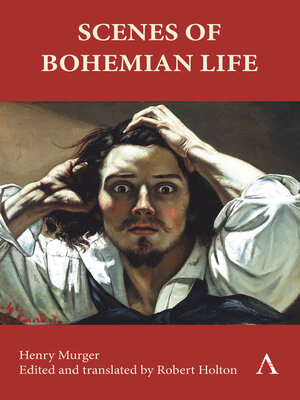
Sign up to save your library
With an OverDrive account, you can save your favorite libraries for at-a-glance information about availability. Find out more about OverDrive accounts.
Find this title in Libby, the library reading app by OverDrive.



Search for a digital library with this title
Title found at these libraries:
| Library Name | Distance |
|---|---|
| Loading... |
This bookis a new translation of Henry Murger's influential Scènes de la vie de bohème, first published in French in 1851. The book recounts the lives of a bohemian group of creative young people as they fall in and out of love, endure cold and hunger, enjoy drunken parties, see their friends suffer and die of poverty, and finally emerge as mature artists. The book's publication soon inspired many (mostly young) people to seek out a bohemian life in Paris and other cities around the world. Not only did it inspire people at the time to change their lives, it also inspired Puccini's beloved opera La Bohème(1896) and, a hundred years later, Jonathan Larson's phenomenally successful Rent (1996). Few works of literature have had such a social impact. Bohemian cultures and subcultures have been with us ever since and Murger's book remains an engaging and satisfying work of literature.
|First published in 1851, Henry Murger'sScènes de la vie de bohèmebrought together the stories he had written for a small arts newspaper in Paris. These semi-fictionalized tales, drawn from the daily lives of Murger and his friends, portray the struggles and celebrations, the loves and losses, of young writers and artists as they eked out an existence on the impoverished margins of society. While the nineteenth-century Parisian setting is fascinating in itself, the stories have retained their contemporary relevance as the continuing popularity of Puccini's opera adaptation (La Bohème) and the Broadway success of Jonathan Larson's Rent—both based on Murger's stories—have demonstrated.
Life in bohemia continues to attract young people in great numbers, just as it has done for almost two centuries, and it is Murger's bohemia, with all its energy and eccentricities, that underlies that appeal. Balancing humor and despair, and optimism and desperation, Murger's characters, much like today's bohemians, manage to confound landlords and bill collectors, endure cold and hunger, find love and lose it, party without restraint and confront the devastating deaths of friends and lovers.
With this new translation, readers can once again encounter the point of origin for the bohemian cultures that have flourished ever since, not only the source for Puccini's and Larson's phenomenally popular musical works as well as for numerous films and songs over many decades but also a classic work of literature that will re-introduce English readers to Rodolphe and Mimi, Marcel and Musette, Schaunard and Colline, after too long an absence.







